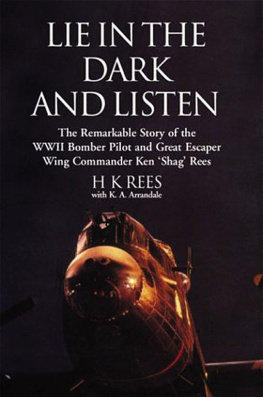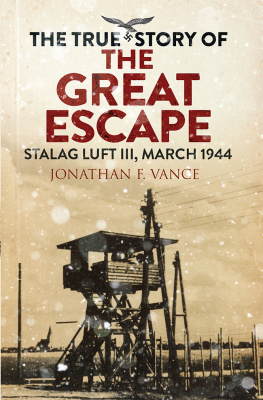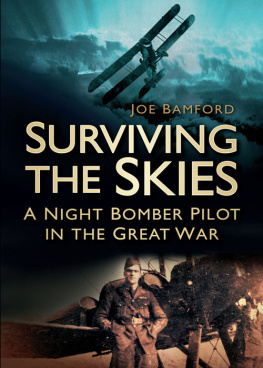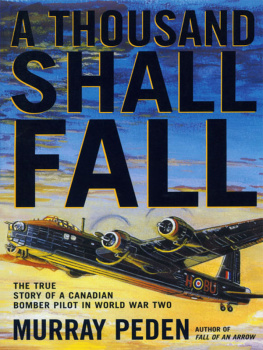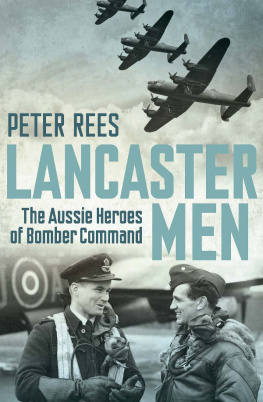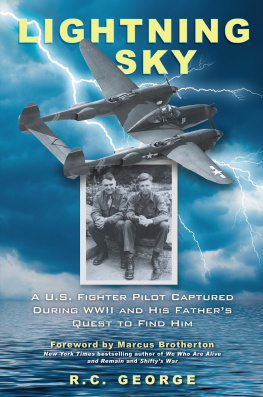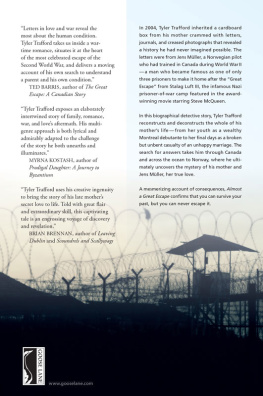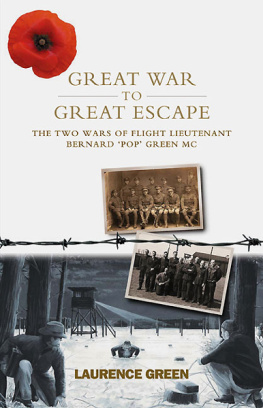
Published by
Grub Street
4 Rainham Close
London
SW11 6SS
Copyright 2004 Grub Street, London
Text copyright 2004 Wing Commander Ken Rees and Karen Arrandale
British Library Cataloguing in Publication Data
Rees, H.K.
Lie in the dark and listen
1. Rees, H. K. 2. Bomber pilots Great Britain
3. World War, 1939-1945 Personal narratives, British
4. World War, 1939-1945 Aerial operations, British
5. World War, 1939-1945 Prisoners and prisons, German
6. Prisoner-of-war escapes Germany
I. Title II. Arrandale, K.A.
940.544941092
ISBN 1 904010 77 6
Digital Edition ISBN: 9781908117496
All rights reserved. No part of this publication may be reproduced, stored in a retrieval system, or transmitted in any form or by any means, electronic, mechanical, photocopying, recording, or otherwise without the prior permission of the copyright owner.
Typeset by Pearl Graphics, Hemel Hempstead
Printed and bound in Great Britain by
Biddles Ltd, Kings Lynn
Contents
Acknowledgements
My sincere appreciation to Karen Arrandale whose hard work and expertise enabled this book to be published. Rob Davis for the use of his research. The late Ley Kenyon for his sketches. The RAF Museum, Hendon. Bill Fordyce for his cartoons.
To my wife for her support over the years it took me to complete this book. And in memory of Gwyn Martin, my navigator and life-long friend.
Lie in the Dark and Listen
Lie in the dark and listen,
Its clear tonight so theyre flying high,
Hundreds of them, thousands perhaps,
Riding the icy, moonlight sky.
Men, material, bombs and maps,
Altimeters and guns and charts,
Coffee, sandwiches, fleece-lined boots
Bones and muscles and minds and hearts
English saplings with English roots
Deep in the earth theyve left below,
Lie in the dark and let them go
Lie in the dark and listen.
Lie in the dark and listen
Theyre going over in waves and waves
High above villages, hills and streams
Country churches and little graves
And little citizens worried dreams.
Very soon theyll have reached the sea
And far below them will lie the bays
And coves and sands where they used to be
Taken for summer holidays.
Lie in the dark and let them go
Lie in the dark and listen.
Lie in the dark and listen.
City magnates and steel contractors,
Factory workers and politicians
Soft hysterical little actors
Ballet dancers, Reserved musicians,
Safe in your warm civilian beds.
Count your profits and count your sheep
Life is flying above your heads
Just turn over and and try to sleep.
Lie in the dark and let them go
Theirs a debt youll forever owe
Lie in the dark and listen.
Nol Coward
Introduction
Today in an age when the mere fact of being in a theatre of hostility (not necessarily hostilities) generates the medias definition of hero, I can still only think of the Great Escape as an event in which men did their duty. That, I think, is sufficient, and if others will think of all of us, those who were murdered and those who survived, in such a manner, I believe we would all be content.
Tony Bethell
Life is pretty dull these days.
When I was twenty-one I had already flown fifty-six missions, got married, been shot down into a remote Norwegian lake, questioned by the Gestapo and sent to Stalag Luft III, where I took part in what became known as The Great Escape.
If the war hadnt intervened, instead of the stuff of films I suppose my life could have been the stuff of television. Are You Being Served say, rather than The Great Escape. My father had me down for a nice, steady career at Gorringes, then one of the smartest stores in London and the ultimate in stuffy respectability, where the most exciting event on offer was a deadpan discussion (by ones superiors, of course) of the woven texture to be found in ladies foundation garments. Well, I escaped Gorringes, lied about my age and joined the RAF instead. At seventeen I craved danger and excitement; I liked fast planes and cars, rugby, speed and women, not necessarily in that order, and like many of my generation I thought myself lucky to get caught up in a wartime which provided both.
It is difficult to convey to a generation not brought up to it the intensity of life back then and the extremes we lived through. On the one hand we were moving away from the rigid social systems of our parents and grandparents, but there were still more rules around to break and bend. Any schoolboy can tell you how much fun it is and how satisfying it can be breaking rules which are primarily designed to keep you in your place. Having said that, I must also draw attention to the fact that this same naughty schoolboy climbing up the drainpipe of a night to some girls bedroom window, might the next day be in charge of an aircrew, with responsibility for a large and expensive aircraft, six men on board, and going three hundred miles behind enemy lines where he was expected to avoid the enemy flak and fighter aircraft, drop his bombs accurately and then get his crew safely back home. He might have to do this and watch other planes being shot down, and watch men who were his friends being incinerated alive but still stick to his orders. All this, when most of us were barely out of our teens. Rules, we all knew, were different from orders. Rules you could break and have a good laugh about it; orders you had to obey, no question.
I want to tell my own story, my own part in these large events which are rapidly passing into legend as we former kriegies gradually move out of this world. Its difficult to recapture, much less convey to non-kriegies what it meant to us. Prince Philip, though, summed it up pretty well at a recent dinner for ex-POWs:
I do not believe that anyone who has not experienced it can understand what life as a Kriegie must have been like. It is really a secret society or, rather, a society which shares a secret which very few others can hope to penetrate. The common bond which draws these men together is composed of many strands. The death casualties in Bomber Command far outstretched those of any other arm of the services. So that the main strand of the bond is gratitude for continuing life. The others are the sharing of the formidable dangers, and the realization of the gifts of freedom and liberty. These are among the secrets which are shared by men who, in some cases for many years, existed in the closest proximity under unique conditions.
Part One
the most delightful flying club in the world
Max Hastings
CHAPTER ONE
The Most Delightful Flying Club in the World
Ignorance, someone once said, is one of the most effective survival modes. But theres nearly always a turning-point, when some ferocious rite of passage into knowledge changes you forever.
It was 1940 and life seemed pretty damned good. I was young and fit, driving my own car a decrepit Baby Austin, true, but mine, affectionately called Clattering Clara Clutterbuck as fast as I liked along deserted wartime roads in North Wales, on my way home to be fussed over and fed by my loving mother and admired by my sisters. I had a weekend pass in my pocket and was totally full of myself. At that moment it didnt matter that there was a vicious war going on or that the grim struggle called the Battle of Britain was being fought elsewhere while I enjoyed the relative safety, security and good food of the family farm near Ruabon. When I pulled up at a garage and flashed my official voucher for supplementary petrol I was sure I could detect in the proprietors face how impressed he was by the Royal Air Force Station, Meir and U/T Pilot after my name. Well, so he should be impressed. I was Aircrew now.
Next page
